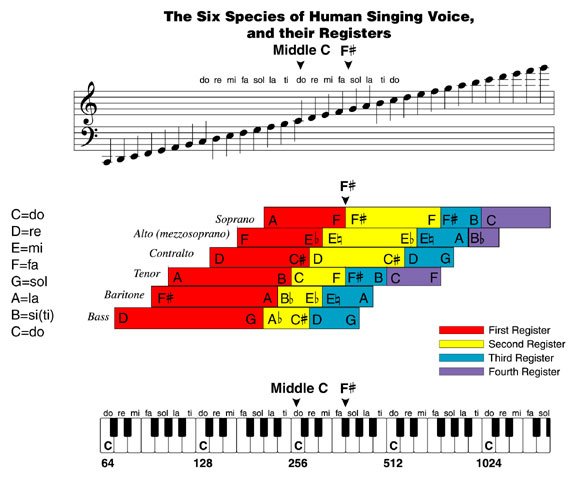Entry 04
Sing on pitch vs Sing with intonation
Subtitle: How to guide monotonous singers who has pitch but no intonation
Human voice can range from very low to very high. You can take a look at below reference image to gauge the range compared to the piano range.
Often times, I meet students who are really accurate with the *pitch, and good vocal range and still, their overall expression and phrasing skills are far less than ability to sing in tune. Sometimes their voice sounds as if it is locked within the individual notes and the melody line is mostly disconnected.
*Pitch: the low and high of the sound and voice
Expression is an action of letting one’s feelings known - and when the notes are disconnected, it’s kind of like drawing the emotion with dotted line - where you can ‘guess’ the intended expressional flow, but overall vague and disconnected.
Why would such problems happen in singers?
I find that answer from my own personal experience In fact, I was the perfect example of the above mentioned issues - and I’d say I was more surprised to find the same problems in people I needed to teach. I would not generalise this reasoning to everyone, yet it seems quite applicable to many singers that I have met.
1) Previous Musical Training
I learned piano since age 7 and most of the time I learned classical pieces. Starting from basic finger execises (hannon) moving towards more difficult pieces. Classical piano is quite simple when it comes to knowing whether the note is Right or Wrong. If you missed the note, then you MISSED the note. There is no room for flexibility or intonation. In my understanding of music - every single ‘note’ had to be played correct.
By the time I started singing in choir, the idea of having to stay on the ‘exact note’ applied directly to the singing. Choir environment was even more encouraging the ‘simple’ note based singing as individual differences and intonations could ruin the overall harmony of the entire choir.
The habit of singing like a voice sample of some midi machine lasted for very long time, and I needed to force myself to break out from it.
2) Language Difference
Everyone from Asian countries (Korea, Japan, China, Vietnam, Thailand, Singapore etc) who had to pick up English as a second language would probably have experienced the challenge of ‘speaking the language’.
As a foreign language learner, Speaking and Listening was always more difficult than Reading and Writing. Aside from the fear of having to continue the ‘realtime’ conversation - the difficulty exists in adapting to the pronunciation and intonation of English.
Compared to the majority of Asian languages that are Syllable Timed, English as a spoken language is a Stress Timed Language. With to the rise and fall, and extension of the duration of the vowel articulation - English language creates certain type of melodic contour.
The speech intonational qualities greatly affect the authenticity as well as the emotional expression of the singing. And if the singer has strong foreign accent or pronunciation habits, most likely the person will apply the accent to their singing too.
Therefore, practicing the intonation and phrasing of songs of different language requires a very close attention to catching the subtle differences and multiple rounds of practice to correct it.
My above example largely explains learning of English Songs, but similar approach of understanding the phonetic/intonational differences of the languages can also help the singers to figure out why their singing sounds so flat or disconnected.
Breaking away from singing the ‘fixed note’, and allowing the phrases to flow more intonation can actually be extremely difficult and can take a very long time to achieve. It’s because they exist mostly as our strong habits.
3) So how ?
Many vocal coaches/ music teachers warn about the danger of picking up the bad habit, because the unlearning process can be more painful than the learning of new skills.
But the job of a vocal coach is to enable students to overcome their old habits that blocks the progress. So more attention would have to go into thinking about how to create more effective exercises as well as how to make the continuous practice to be less painful and tedious.
One approach that I take is ‘DECOUPLING’.
For example, if the student is so fixated on having to sing the note on its precise pitch when it comes to singing, I would think about un-coupling the ‘music’ component and just focus on opening more flexibility of the voice and help students experience the sound that existed between 2 semitones through non-musical voice exercises.
If the language habits pose as a barrier for the students to fully adopt new ways of intonation in singing, I’ll be replacing the words of lyrics with meaningless syllables or vowels to practice the phrasing or intonation. In the meantime, I would also try to find out details of how the student has developed such habits.
Knowing and understanding more about the students help the coaches to come up with solutions for breaking a strong tie they used to hold and make a new connecting point to singing.
Helping people express themselves in singing - in slightly different words would be to help people become more fluent in their expression in singing. Singing with more intonation one major element for this fluent expression.
The process can be sometimes long and tiring, but the reward that comes from the achievement is so great. So never give up😃
Thank you for reading 🙏


